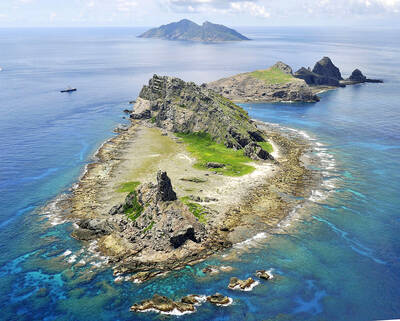This is a very depressing book, paradoxically because it tries to be just the opposite. It claims there is hope, whereas I believe there is none.
George Monbiot is the well-known UK political commentator whose columns often grace the pages of the Taipei Times. He's known for his well-researched opposition to, among other things, the Iraq war. But in Heat he focuses his attention on global warming. As he remarks in its opening pages, he doesn't want to have lived ignoring the most important issue facing the planet. And for the last few years Monbiot, in his Oxford hideaway, has been convinced that global warming is precisely that.
His dramatic sub-title is "How to stop the planet burning" and he indeed believes it isn't too late. Some observers, such as the geophysiologist James Lovelock, believe all is already lost. But Monbiot thinks the seemingly impossible task can be accomplished. We can mend our ways, and life on earth can, if we're really determined, be saved.
But Monbiot is nothing if not an honest man, and there's no way he'll champion green causes en masse. This book is in large part made up of scrupulous examinations of the claims of wind power, solar power, wave power, methane gas from pig farms and the rest. In almost every case Monbiot concludes either that only little can be accomplished or that the game isn't worth the candle. He will make many enemies among environmentalists with this book, but he continues to insist nonetheless that, for instance, wind turbines on people's houses to be effective would have to be so big that they'd rip the roof off in a high wind. Again and again he comes to comparable conclusions.
One of the biggest obstacles to any easy answers is Monbiot's belief that the UK — the main focus of his attention — must reduce its greenhouse emissions by a staggering 90 percent if the tide of destruction is to be turned. By implication, other countries must do likewise. But how is this ever to be achieved?
The only way, he concludes, is by a massive reduction in the possibilities of life. We can no longer expect to fly off on long-distance holidays (aircraft are one of his biggest bugbears). The world can no longer expect to go on eating meat, fruit and vegetables imported by air from distant lands. Flights, he says of the UK, must be reduced by 96 percent. (Can anyone believe this will take place?) The construction of new airport runways must be resisted at all costs, and what flights are allowed should be by propeller-driven planes, much less polluting than the evil jets.
"Allowed" — ah, there's the rub. Monbiot knows people are not going to sacrifice the pleasures they currently enjoy willingly. Governments are going to have to make these kind of decisions over their heads, and then enforce them by massive taxation and outright prohibition.
A root-and-branch puritanism, in other words, is going to have to become the ethos of the future, with the population going around in woolly hats against the cold rather than sitting in front of warm and emission-producing fires. It's a gloomy picture, and all very English. But Monbiot points out that the current living standard enjoyed by Britons is the highest they've ever know, and they can't expect it to continue indefinitely.
This brings us to why this book is intrinsically so depressing. The reason is that what he proposes is simply not going to happen. It may just be that the UK, especially while under the leadership of a man like Blair who is desperate to get a wise and far-sighted image engraved on the tablets of history, might pass into law a few of Monbiot's ultra-austere recommendations. But what about the so-called "developing" nations"? Are China, India, the Gulf states, Brazil, and many, many more, really going to opt for these kinds of self-denying ordinances?
Everyone knows that this is not going to take place. Only this month China's emissions were reported as having increased hugely. Cars are being manufactured at an ever-increasing rate, and all aspiring citizens in the new economies want to own one. Their governments are not going to stop them, or not until they have reached the level of car-ownership enjoyed by the developed nations. In other words, global emissions are all set, not to diminish, but to increase rapidly.
It's not a question of lemmings willingly heading towards their doom. It's rather one of human beings not being constructed in a way that will let us put long-term security ahead of short-term pleasure. Consumption is what the newly-prosperous want, and this is precisely what Monbiot is saying they can't be allowed to enjoy.
I'm not arguing that he's wrong. What makes this book uniquely depressing is that he's almost certainly right, but that it's not going to happen. Global temperatures are rising, will continue to rise, and almost certainly won't be diminished. But people don't like to think in this way. Scientists will come up with some devices that will save us, we assume. Electric cars will contribute a lot, plus nuclear power derived from fusion, rather than the current fission, processes. Monbiot examines these options, and in most cases concludes that they aren't going to come to pass any time soon. That's another reason why this book makes such bleak reading — George Monbiot is so determined not to be hoodwinked by false optimism.
So, what is likely to happen? Is 99 percent of life to be extinguished, as it was, apparently, at the end of the Permian Era 251 million years ago? Are people going to continue to search for the good life, emitting away like crazy, even as the temperatures go up and up — like a man condemned to death by boiling calling for another drink even as the fires under his tin bath are being lit?
My hunch is that a different, far nastier, option may prevent this scenario from becoming reality. It seems to me far more likely that nuclear weapons will proliferate uncontrollably, and just as all other weapons that have ever been invented have been used, so too will these be. Small nuclear conflicts will become the norm, and from them bigger nuclear wars will follow. Eventually all civilized life will cease and, though radiation will have effects that will continue for at the very least 30,000 years, human pollution by means of exhaust and other fumes will largely stop. It isn't an attractive prospect, but is appears more likely than the voluntary repudiation of almost all our current conveniences advocated by the austere — albeit honest, scrupulous and disinterested — George Monbiot.
One of this book's conclusions, incidentally, is that the least polluting form of public transport is the long-distance coach. Such vehicles in the UK, he observes, are reserved for the poor. They wander from one deprived area to another to pick up customers, and deliver their exhausted passengers at their final destination in a state of almost total lack of self-esteem. What the UK needs, Monbiot urges, are modern, luxurious, hi-tech coaches that pamper their passengers and speed along highways to the envy of all other travelers. Well, he only has to take a look here to see precisely that system already in operation. It's one small crumb of comfort for Taiwanese readers on this otherwise dispiriting Sunday morning.

The Lee (李) family migrated to Taiwan in trickles many decades ago. Born in Myanmar, they are ethnically Chinese and their first language is Yunnanese, from China’s Yunnan Province. Today, they run a cozy little restaurant in Taipei’s student stomping ground, near National Taiwan University (NTU), serving up a daily pre-selected menu that pays homage to their blended Yunnan-Burmese heritage, where lemongrass and curry leaves sit beside century egg and pickled woodear mushrooms. Wu Yun (巫雲) is more akin to a family home that has set up tables and chairs and welcomed strangers to cozy up and share a meal

The second floor of an unassuming office building in central Bangkok is a strange place to encounter the world’s largest rodent. Yet here, inside a small enclosure with a shallow pool, three capybaras are at the disposal of dozens of paying customers, all clamoring for a selfie. As people eagerly thrust leafy snacks toward the nonchalant-looking animals, few seem to consider the underlying peculiarity: how did this South American rodent end up over 10,000 miles from home, in a bustling Asian metropolis? Capybara cafes have been cropping up across the continent in recent years, driven by the animal’s growing internet fame.

President William Lai (賴清德) has proposed a NT$1.25 trillion (US$40 billion) special eight-year budget that intends to bolster Taiwan’s national defense, with a “T-Dome” plan to create “an unassailable Taiwan, safeguarded by innovation and technology” as its centerpiece. This is an interesting test for the Chinese Nationalist Party (KMT), and how they handle it will likely provide some answers as to where the party currently stands. Naturally, the Lai administration and his Democratic Progressive Party (DPP) are for it, as are the Americans. The Chinese Communist Party (CCP) is not. The interests and agendas of those three are clear, but

How the politics surrounding President William Lai’s (賴清德) proposed NT$1.25 trillion (US$40 billion) supplementary special defense budget plays out is going to be very revealing. It will also be nerve-wracking, with political, geopolitical and even existential stakes in play that could change the course of history. Lai broke the news of the eight-year, multilevel national security plan in the Washington Post, describing the centerpiece of it this way: “I am also accelerating the development of ‘T-Dome,’ a multilayered, integrated defense system designed to protect Taiwan from [People’s Republic of China (PRC)] missiles, rockets, drones and combat aircraft.” For more details and